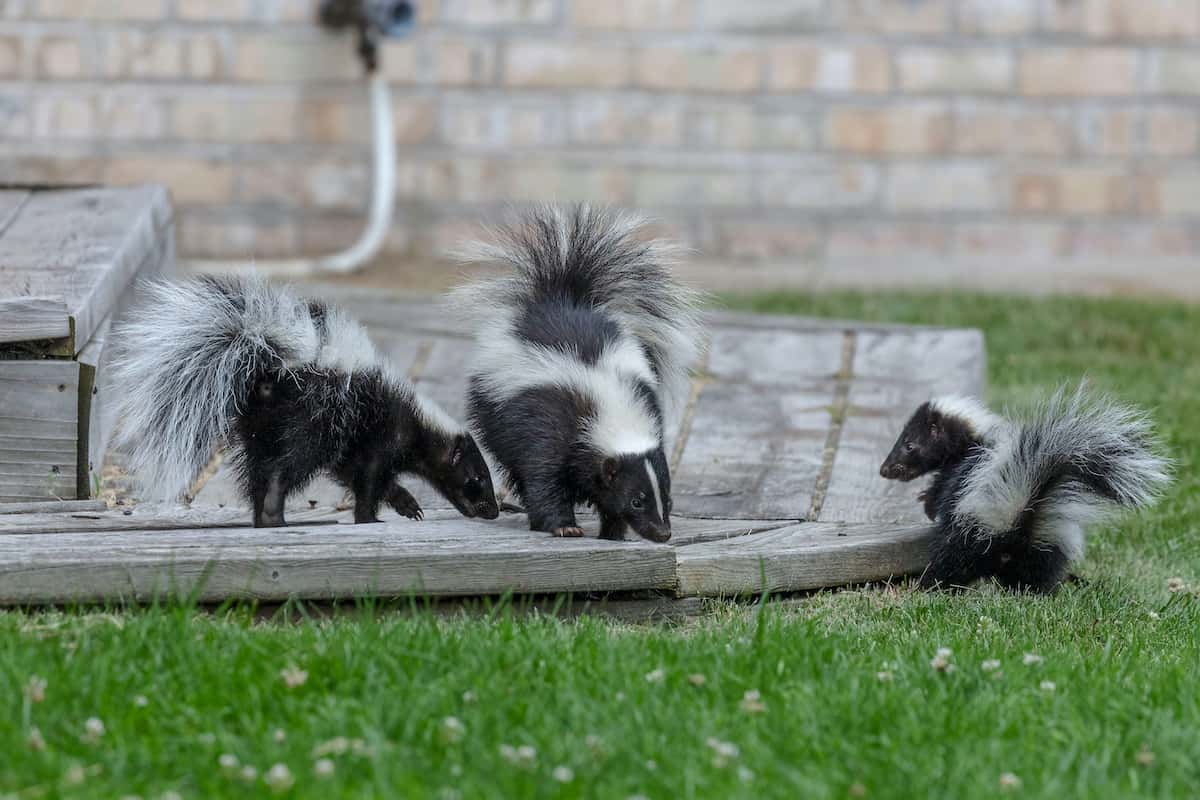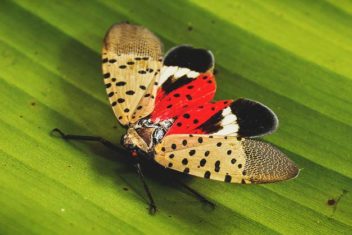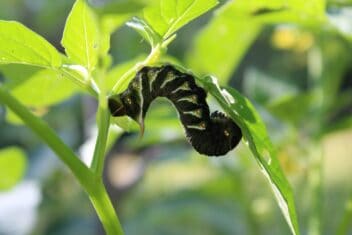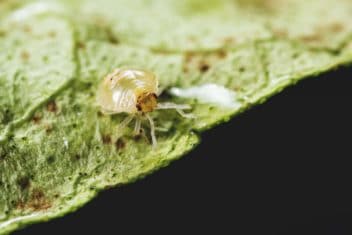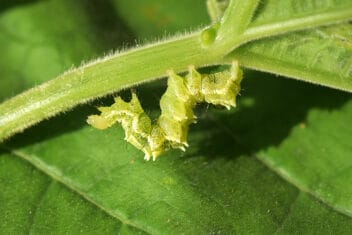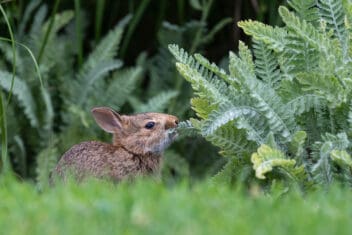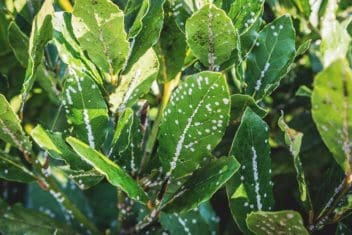Noticing shallow little holes in your garden beds? Maybe your strawberry patch is suddenly bare? You may have skunks in your garden!
When it comes to dealing with pests in the garden, there seems to be an endless variety. From moles to cutworms, there’s always something trying to take advantage of your bounty. So what do you do when that garden interloper happens to be able to defend itself with a cloud of stink?
Here’s how to know you have a skunk problem and what to do about it, all without hurting our little black and white buddies.
Getting to Know Our Stinky Friend
Skunks are found all over the U.S. and might be most recognizable by their musky odor, second only to their black and white coloring. There are a dozen species of skunks, but the most common is the striped skunk.
The other common species are spotted Eastern, spotted Western, the hooded skunk, which is found in the southwest, and the hognose skunk, found in the Rocky Mountains.
Skunks are nocturnal and mainly forage at dawn and dusk. You may never see the actual skunk, just smell the lingering odor.
Skunks are actually laid back, mild-mannered, and not at all aggressive. They’re not out to get you, but they will spray when feeling cornered or threatened.
I have been doing wildlife rehabilitation with Fox Run Environmental Education Center for the past seven years and raise between 10-15 orphaned baby skunks every year. Sadly, many baby skunks find their way to us because their mom is either killed on the road or by someone who was afraid of her.
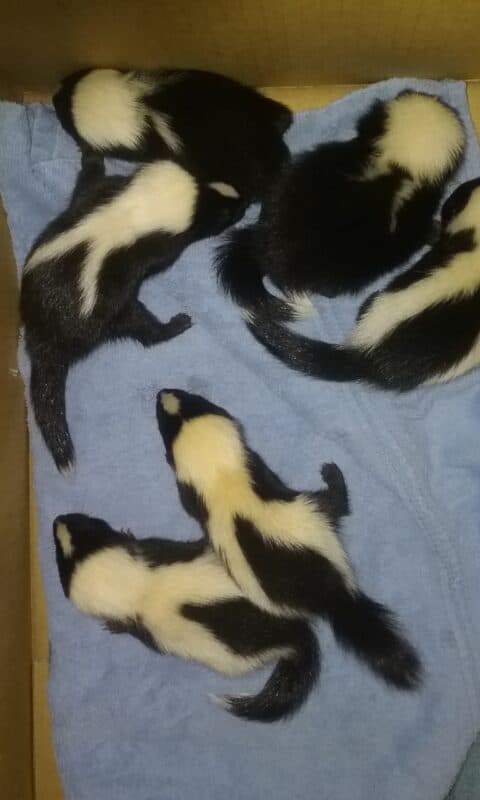
In all the time I’ve worked with them, I’ve never been deliberately sprayed by a young skunk. When we give them their shots that’s a different story! We wrapped them in towels because when they get pricked by the needle, they do leak!
Why Are Skunks a Problem in the Garden?
Skunks are diggers. They eat predominantly insects, earthworms, frogs, and small mammals that live in the soil such as moles. They have long claws on their feet that they use to dig in the earth looking for food.
Skunks also love fruits and will forage for wild berries, fungi, and nuts. They may think your berry bushes were planted for them.
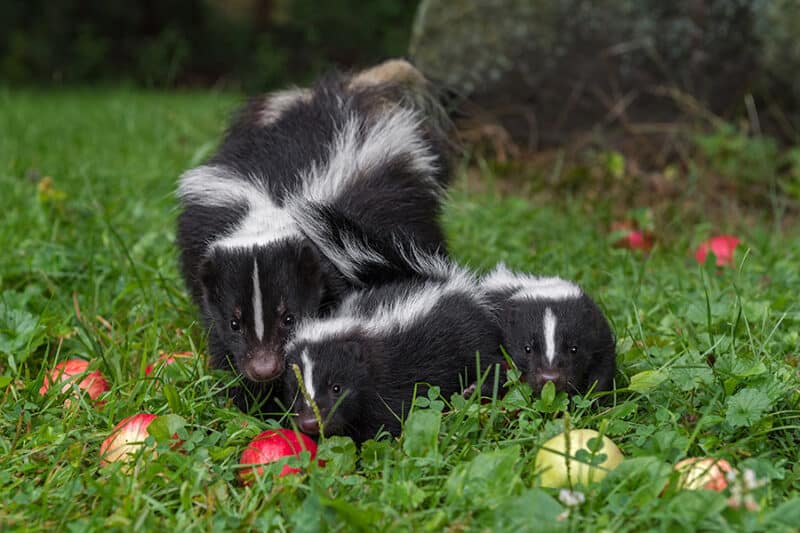
The digging becomes a problem when they do it in your garden. In an effort to look for food they may dig up or damage young seedlings and low growing plants like lettuce.
Strawberry patches are at risk as are other low fruits such as brambles. They may also dig into your compost pile.
Skunks will also root around in your yard to find a snack. They will dig in flower beds and around trees. If you see holes in the yard about three inches deep it is probably a skunk looking for a meal.
Skunks will also be attracted to your yard if you have loose trash or food out for animals.
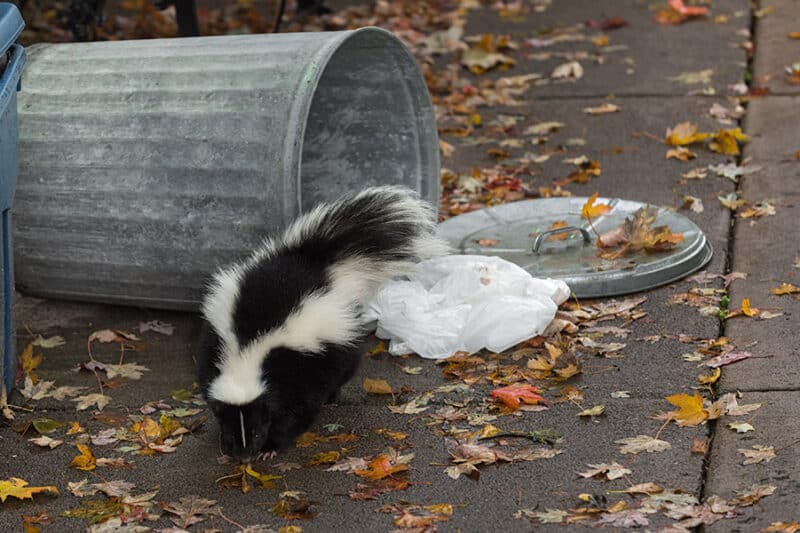
Skunks love a freshly tilled garden, especially an organic one with lots of compost. All that wonderful dirt is full of grubs and earthworms. Skunks do not typically eat young seedlings, but they will dig them up and destroy them in their quest for bugs.
Skunks really love berries. Your strawberry and blueberries are particularly prone to their foraging.
Skunks and Bees
It’s not just your garden you need to watch out for. Your apiary is in danger, too. One of the few predators besides Pooh of the honeybee is the skunk.
Mother skunks have been observed teaching their children to scratch at the entrance of the beehive. When the guard bees come out to investigate, the skunks eat them. The skunks do this at night because the bees that leave the hive are at a disadvantage. Bees don’t navigate well at night.
The video below shows a skunk raiding a hive. The skunk catches one bee at a time so it doesn’t make a big impact on the population. I find it humorous that the videographer keeps saying the skunk doesn’t know he’s there because they don’t see well. That’s true, but skunks smell quite well!
The Benefits of Having Skunks Around
They sound like a real pest, but skunks do have benefits in the garden. They eat a number of damaging bugs. Japanese beetle larvae are a favorite snack. They will also eat cutworms, hornworms, yellow jackets, and cabbage worms.
If you are having an infestation of these bugs then you may feel more tolerable towards the skunk. You can always take precautions to protect more vulnerable plants.
Skunks also eat mice and voles, which can be a welcome help if you’re struggling with an infestation.
How to Protect Your Plants from Skunks
If you want to encourage skunks while keeping them from eating your plants, there are several techniques you can use. Or, if you just want to keep them away altogether, there are options for that, as well.
Use a Barrier
The best way to protect your plants from skunks is to have a good garden fence. You can use several types of fences specifically for skunks. You might also use a one-type-fits-all model that blocks out a variety of garden trespassers.
Skunks are not good climbers, so a fence targeted at them doesn’t need to be over two feet tall. They typically don’t bite through the fence as a raccoon can, so you can use woven mesh or lightweight hardware cloth.
The key element to making a fence skunk proof is that it must extend into the ground. Remember skunks are diggers. Like groundhogs, they will dig under the fence to get to the goodies.
Dig a trench around the perimeter of your garden that’s two feet deep. Place your fence in the trench and secure it with dirt. That way, when the skunk tries to dig under the fence they will hit the wire and give up.
Skunks are not nearly as persistant as raccoons.
Electric Fencing
You can also use an electric fence. A single strand a foot above the ground may work, although a skunk may figure out they can belly scoot under the wire. Skunks are quite smart and are good problem solvers.
Electric netting works well. The skunk won’t try to get over or under it once they get there nose shocked a few times.
Try Lights
Skunks typically are active at night. However, don’t be frightened if you see a skunk during the day. If they’re hungry they will come out to look for food.
Skunks have poor eyesight and rely on hearing and smell. They aren’t fans of bright sunlight.
Place spotlights or motion sensor lights near vulnerable plants. When the lights come on the skunk will retreat. A skunk may eventually figure out that they can just work through the light, however. Remember, they’re quick learners.
Predator Urine
A concentrated form of canine urine may keep skunks away. Wolf or coyote urine is best.
You can buy coyote urine at your neighborhood nursery or big box store. Make sure they collect urine in a humane manner and comply with USDA regulations.
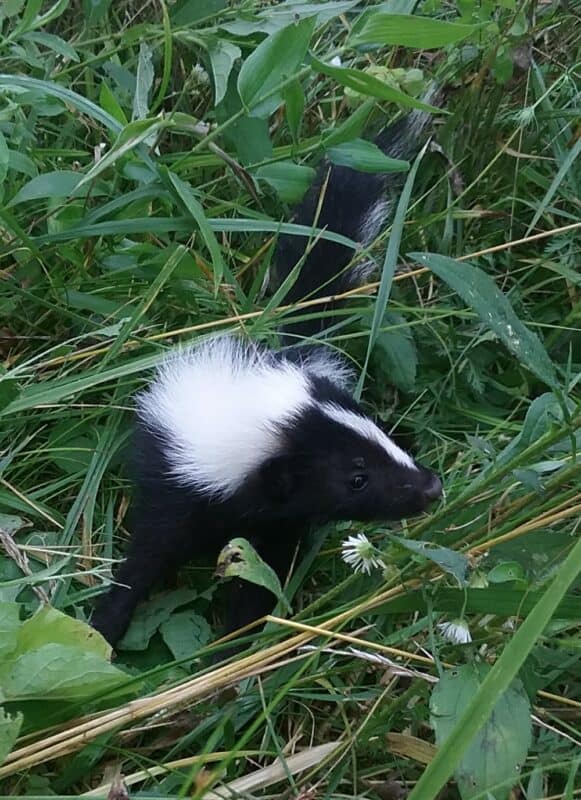
Protect Your Seedlings
Often your plants that are at risk are your young seedlings and transplants. The skunk may dig them up or inadvertently walk all over them in their quest to get to the juicy worms.
If you just have a few tender seedlings you can use cloches.
You can also build a wire cage over your plants. This works especially well with strawberries.
Using landscaping fabric will provide your transplants with warm moist soil. It will also discourage skunks from digging in the garden.
Close up Nesting Spots
Do you have a garden shed or outbuilding that sits on skids or a block foundation. Skunks love to hang out under sheds during the day and females may decide it’s a good nesting spot.
You can prevent this by sealing up the underside with hardware cloth. Don’t use chicken wire. Chicken wire is only good for chickens. Other animals such as skunks, raccoons, and opossums can easily rip through it.
Before you seal off the shed shine a flashlight underneath to make sure you are not sealing any animals in.
Look for other inviting spaces, like openings to your crawlspace or under stairs.
Control Their Dinner
Skunks may be attracted to your yard because you have a thriving population of grubs, especially Japanese beetles. Use milky spore or beneficial nematodes to help reduce grub populations.
What NOT To Do For Skunk Control
Now that you know how to control skunk populations, it’s time to dispel some myths. There are some recommendations out there that aren’t effective, humane, or practical.
Trapping or Shooting
For many reasons trapping and relocating should be avoided. It’s illegal in many areas, in part because it’s cruel to the animal.
Forcing an animal to change territories puts them at risk to be killed by the dominant animals in that area. They may also not be able to find food in unfamiliar surroundings.
You may be able to hire an animal control company to remove a nuisance animal. However, many of these companies kill the animal. Even though they portray humane options they are often required by law to kill any rabies vector species they remove.
Similarly, it can be illegal to shoot an animal and it isn’t humane or the safest option out there.
Citrus Peels or Oil
Some gardeners will tell you to put citrus peels around to deter skunks. I’m here to tell you that technique doesn’t work. My baby skunks love citrus fruit. If it’s a fruit – any fruit – they eat it!
Along the same lines, I have heard that castor oil or oils that contain capsaicin repel skunks. I haven’t tested this strategy so you may have to experiment. The theory is that the smell messes with the skunk’s ability to sniff out its dinner, so it will leave.
Dog Urine

If you can use coyote and wolf urine, why not use dog pee to keep skunks away? You can try, it but I think that dog urine is much less effective. In my experience with wildlife, they are desensitized to the smells of people and pets – especially in urban areas.
Watch Out for the Warning
So what do you do if you’re out working in the garden and you encounter a little black and white friend? Are you doomed to days of smelling skunky? Nah… skunks don’t spray randomly. They give a warning.
If the skunk stomps its front feet, they’re telling you (or your dog) to back off and give them some space.
If you don’t pay attention to the stomping feet they will turn around and display their bottom with their tail raised. This means, “I’m counting to three folks!” 1 – 2 – 3…
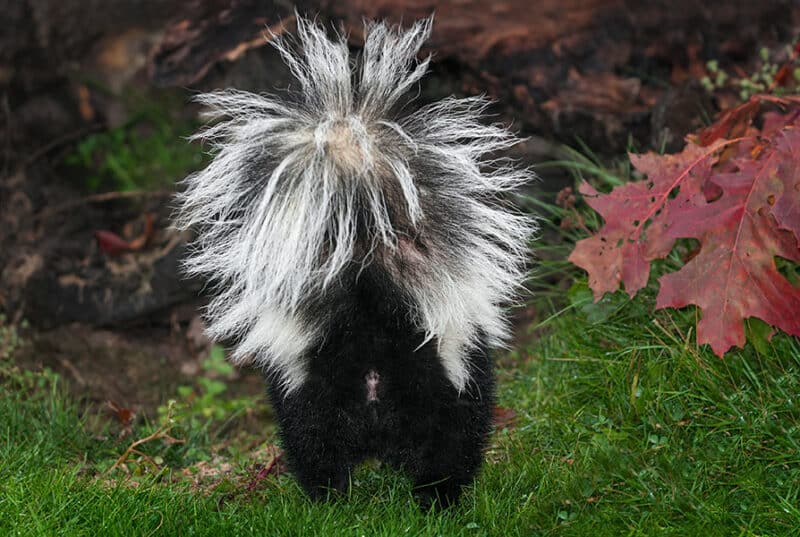
If the threat doesn’t back off at that point, then the skunk releases their musk oil. That means you have plenty of warning to get you (or Fido) out of the way.
Skunks are actually cautious about spraying. This is because they don’t have an infinite supply. Their body takes several days to make more oil and fill their sacks again. During this time the skunk feels unprotected.
Skunks Aren’t Such A Big Deal
Skunks are intelligent and easy going animals. I enjoy working with them. In the big picture of wildlife getting into the garden, skunks are probably one of the easiest to deter.
